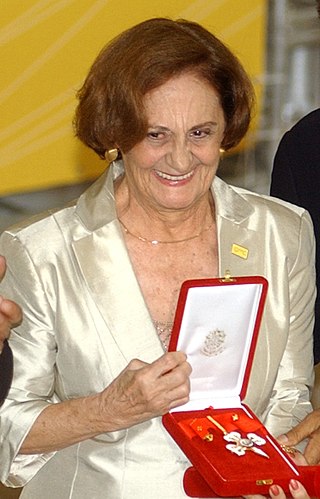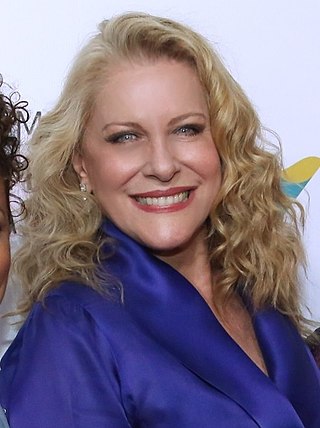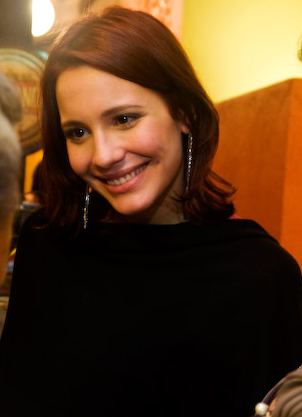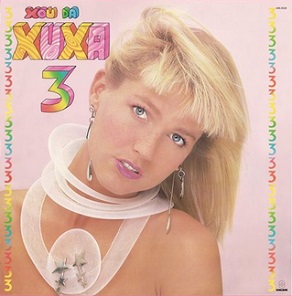
Maria da Graça Xuxa Meneghel is a Brazilian presenter, actress, and businesswoman. Known as the "Queen of Little Ones", Xuxa built the largest Latin and Southern American children's entertainment empire. In the early 1990s, she presented television programs in Brazil, Argentina, Spain and the United States simultaneously, reaching around 100 million viewers daily. Xuxa has sold over 50 million copies of her records worldwide, which makes her the highest-selling Brazilian female singer. Her net worth was estimated at US$100 million in the early 1990s. Also successful as a businesswoman, she has the highest net worth of any Brazilian female entertainer, estimated at US$400 million.

Débora Lima Falabella is a Brazilian actress.

Juliana Didone Nascimento is a Brazilian actress and former model.

Laura Cardoso, artistic name of Laurinda de Jesus Cardoso Balleroni OMC is a Brazilian actress. She is celebrated as one of the best and most well known Brazilian actresses of cinema, theater and television.

Bianca de Carvalho e Silva Rinaldi is a Brazilian actress. She is best known for her roles in telenovelas, especially A Escrava Isaura.

Marília Soares Pêra was a Brazilian actress, singer, and stage director. Hailed as "one of the decade's [1980s] ten best actresses" by Pauline Kael, Pêra won the National Society of Film Critics Award for Best Actress in 1982 for her role in Hector Babenco's acclaimed Pixote, and received Best Actress awards at the Gramado Film Festival and at the Cartagena Film Festival for Carlos Diegues' Better Days Ahead. Other films include Bar Esperança, Angels of the Night, and Diegues' Tieta do Agreste.

Marcos Pasquim is a Brazilian actor who has been appeared on both television and film.

Lúcia Maria Werner Viana, better known as Lucinha Lins, is a Brazilian actress and singer-songwriter.
Graziella de Cássia Schmitt Silva, commonly known as Graziella Schmitt, is a Brazilian actress. She played the lead role in the telenovela Amor e Revolução and as of 2013 plays the lead role in Belmonte.

Juliana Knust Sampaio is a Brazilian actress.

Monique de Araújo Alfradique is a Brazilian actress.

Simone Soares is a Brazilian actress.

Leticia Pena Spiller is a Brazilian actress, producer, director, poet, dancer, writer, and singer-songwriter.

Xou da Xuxa 3 is the fourth studio album by Brazilian recording artist Xuxa. It was released on June 30, 1988, by Som Livre. Xuxa' best-selling album, has sold over 5 million copies in Brazil, making it the best-selling brazilian albums of all time, as well as the best-selling album by a female artist in the country.

Xou da Xuxa is the second studio album by Brazilian recording artist Xuxa. It was released on 30 June 1986 by Som Livre, along with her television show in Globo.

Xuxa 5 is the seventh studio album by Brazilian recording artist Xuxa Meneghel. It was released on August 1, 1990, by Som Livre. It was the fifth album in the series Xou de Xuxa. The best-known songs from this album are "Pinel Por Você", "Trem Fantasma" and mainly "Lua de Cristal". The album sold more than 1 million copies in Brazil.

Xou da Xuxa was a Brazilian children's television series directed by Marlene Mattos, and hosted by Xuxa Meneghel. It premiered on Rede Globo between 30 June 1986 and 31 December 1992, with 2000 editions completed. Xou replaced the Balão Mágico program. Later, it was repeated between January and February 1993, in the transition of the changes of programming of the transmitter. Then, Globo replaced the reprises of the Show by the reruns of the Mallandro Show, presented by Sérgio Mallandro. At the same time, the children's program Mundo da Lua TV Cultura, was also on display. In the daily grid of TV Globo, the Xou of Xuxa was replaced by TV Colosso, while the presenter prepared its program displayed on Sundays.

Marília Gabriela Baston de Toledo, best known as Marília Gabriela or just Gabi, is a Brazilian journalist, TV host, actress, writer, and former singer.

Salsa e Merengue is a Brazilian telenovela produced and broadcast at the 7pm timeslot by TV Globo, from September 30, 1996 to May 2, 1997, in 177 episodes.
Bernardo Velasco is a Brazilian actor and model. He became known in Brazil for acting in "Malhação" on Rede Globo in 2011, in 2013 he acted in the soap opera "Pecado Mortal" on Record TV, A Terra Prometida, and in 2017 he was the protagonist of the soap opera "Belaventura".


















